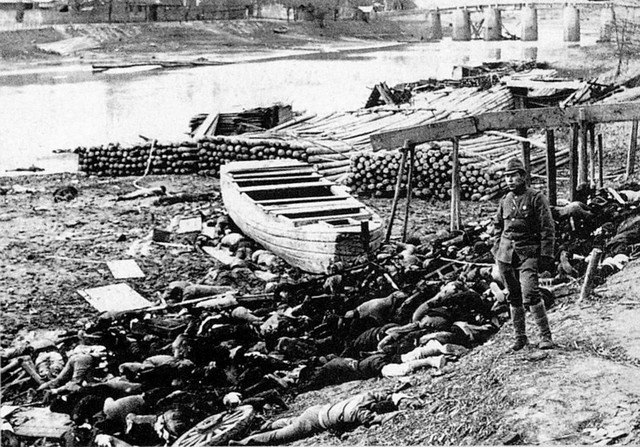For the first time in its history, China commemorated the Nanjing genocide on the 13th of December as a National Memorial Day.
The mass killings and systematic rapes perpetrated by some Japanese soldiers against civilians and disarmed combatants in Nanjing, then the capital of China, for a period of six weeks or so, starting on the 13th of December 1937, is undoubtedly one of the most brutal chapters in the history of 20th century Asia. This genocide occurred in the thick of the Japanese invasion of China. Though estimates differ, it is generally accepted that between 140,000 and 300,000 Chinese perished at the hands of the Japanese during those six weeks of incredible moral depravity and unspeakable human cruelty.
The Nanjing genocide is not just recorded in Chinese archives and etched in the collective memory of the Chinese people. There are numerous well-documented accounts of what happened in Nanjing by Western doctors, missionaries, businessmen, journalists and diplomats who were living there at that time. Japanese writers and activists have also attempted to tell the truth and some have been campaigning for justice for the people of Nanjing and China for decades.
I had some exposure to some of these individuals when I was a guest lecturer on a Japanese Peace Boat — an NGO committed to the promotion of peace — in February 2005. The passengers, almost all of whom were Japanese, were deeply concerned about their country’s role in Nanjing. Their concern, I gathered from the organizer of the peace voyage, was a reflection of how a lot of Japanese felt about a dark blot in their history.
It is important for Japanese who are aware of Nanjing to become more vocal and get more organized at this juncture in the nation’s politics. This is because right-wing nationalists are more emboldened now to push for their agenda since the prevailing political climate in Japan appears to favor them. A number of these elements continue to argue that the genocide never took place!
They have forgotten that two tribunals established after the Second World War, the International Military Tribunal for the Far East and the Nanjing War Crimes Tribunal, had convicted some of the men responsible for the Nanjing genocide of war crimes and put them to death. And, on the 15th of August 1995, on the 50th anniversary of Japan’s surrender at the end of WW 2, the then Prime Minister, Tomiichi Muruyama, apologized publicly for Japan’s aggression, including the atrocities committed in Nanjing, and for the “great suffering” his country had inflicted upon the people of Asia. He should have also provided a written apology.
Muruyama’s successors have failed to build upon his outstanding initiative. Instead, some of them have hardened their position on Japan’s past misdeeds. A couple of them have visited the Yasukuni Shrine where the remains of some ‘Class A’ war criminals including those implicated in the Nanjing genocide are preserved.
If Japanese leaders are sincere about removing one of the longstanding causes of friction between their country and their neighbors in Asia, they should cease making these visits immediately. It would assure Asian societies that were victims of Japanese aggression seven decades ago that Japan has finally repudiated its militaristic past. The present Japanese leadership should also make a much more earnest attempt to resolve its territorial dispute in the East China Sea over what it calls the Senkaku Islands and what the Chinese call the Diaoyu Islands.
At this moment, in the wake of the APEC Summit in Beijing in November 2014, there is a slight thaw in the otherwise tense relations between the Japanese and Chinese governments. That thaw offers some hope for dialogue in view of Chinese President Xi Jinping’s mature approach to the commemoration of the Nanjing genocide. He made it very clear in his speech at the commemoration that one should not “bear hatred against an entire nation because of a small minority of militarists who had launched aggressive wars.”
Given this positive signal from President Xi, can ASEAN, which is geographically, politically and economically close to both Japan and China play a role in reducing the differences and narrowing the gap between these two Asian neighbors? Can ASEAN as a collective entity encourage the two countries to address the thorny issues that separate them through a carefully planned stage by stage dialogue? Shouldn’t Malaysia as the incoming ASEAN Chair for 2015 craft a mechanism for Sino-Japanese dialogue which could lead to a lasting peace between two nations whose diligence, discipline and dynamism (3Ds) when applied in unison could well change the world?
Peace between China and Japan is therefore vital for the future of Asia and indeed the world. We should do all we can to achieve this precious peace within a short span for an obvious reason. There are actors within and without the region who are already exploiting Sino-Japanese tensions in pursuit of their own agendas. We should not allow them to succeed through default.
Dr. Chandra Muzaffar is President of the International Movement for a Just World (JUST).
Malaysia.
22 December 2014.

